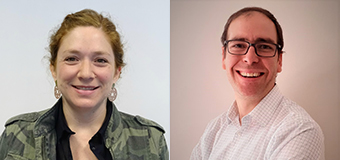Francisca Garay seeks to understand the behavior of tiny particles. Diego García-Huidobro aims to reduce childhood obesity and addictions with family-centered interventions. What do they have in common? Both academics were selected to participate in the World Economic Forum Young Scientists, along with the most promising under-40 scientists on the planet.
Twenty five young researchers, under the age of 40, from 14 countries and the most varied disciplines, are being recognized by the World Economic Forum Young Scientists. It is a global community of young scientists, created in 2009 by the World Economic Forum, based in Geneva.

This year, two UC researchers were chosen, among this select group of scientists: Francisca Garay, an academic from the Faculty of Physics, and Diego García-Huidobro, from the Faculty of Medicine.
They will have the opportunity to share with other young scientists, as well as scientific leaders, politicians and entrepreneurs from different parts of the globe. It is about transforming themselves into global leaders, starting from the role they already play in their own fields.
Particle collider and the origin of the universe
“It is an immense honor to have been chosen. At the same time, it feels like a great responsibility, so I hope I am able to use all these tools in the best way in order to help the country from the scientific perspective, ”says Francisca Garay.
Since she was an undergraduate ten years ago, Francisca has been working on the ATLAS experiment of the Large Hadron Collider (LHC), the world’s largest particle accelerator, built by the European Organization for Nuclear Research (CERN), in Switzerland. Their goal is for the very small particles to collide with each other. This allows us to understand the subatomic world and the laws of nature that govern it.
“I have tried to contribute in various areas of the experiment: hardware, data analysis, software, etc. But my greatest contributions have been in data analysis to understand properties of the Higgs boson -a type of elementary particle that is believed to have a fundamental role in the mechanism by which the mass of elementary particles originates-, for example, which is its mass or if there is more than one Higgs boson ”, he explains.
Currently, the researcher is working – together with Professor Marco Aurelio Díaz, also from the UC Institute of Physics – on the project to build muon detectors that should be installed in ATLAS during the years 2020-2021. The Santa María and Andrés Bello universities also participate in this initiative.
“I also wanted to contribute to another type of experiment, a collider that is linear – the LHC is circular.” This collider is called CLIC (Compact Linear Collider) and is in the approval stage for its construction. Part of the approval stage requires simulated data analysis to demonstrate the capabilities of this collider. That is where I am contributing – in conjunction with former UC student Raimundo Hoppe – with an analysis that studies the ability of this experiment to see an unlikely decline of the Higgs boson, ”the academic details.
Family centered medicine
“This is a great training opportunity. It will be very enriching to have a broader view of the sciences and their impact, and then be able to contribute in the future”, says Diego García-Huidobro.
A doctor trained at UC, Diego specialized in family medicine. With a doctorate from the University of Minnesota (USA) in family therapy, he has worked on numerous investigations focused on evaluating the role of the family in health. “For me, one of the most important social determinants of a person is his family environment. Therefore, in order to prevent or treat health problems, it is essential to work with the family, “he says.
His lines of research are “very practical”, as he himself emphasizes, especially in two lines: childhood obesity, and alcohol and drugs. Always with a user-centered community approach. “Interventions are designed in conjunction with people. It is key to involve the participants in the designs ”, he adds.
All this work has earned him several recognitions, among them, Young Investigator Award, from the World Organization of Family Physicians (WONCA), in 2015; Matilda White Railey Award from the National Institutes of Health (NIH) in the US; and Best Reviewer of the Year, from the American Journal of Public Health.
The challenges
Both academics appreciate the support provided by UC. “UC provides us daily funding contests information, lots of it and support with our applications,” says Francisca. Likewise, Diego adds: “The university has been very important. As doctors we do not have much training as researchers. In my case, I received a lot of support and flexibility to do my PhD ”.
Both also agree that the demand is high. Juggling the load of courses, administrative duties and research compatible is not easy. Nor is it simple to balance personal life with research.
However, the two are also enthusiastic about wanting to continue on this path. “It is an opportunity for my research to have a greater impact on public policies, to be able to contribute to these policies from what I do,” says Diego.
As Francisca concludes: “To generate knowledge, we have to make the common citizen understand the value of science so that they demand more investment from the authorities. I think that, as young scientists, we have to re-enchant ourselves with the role of scientific dissemination, which is often relegated to the background and is looked down upon within the community. “